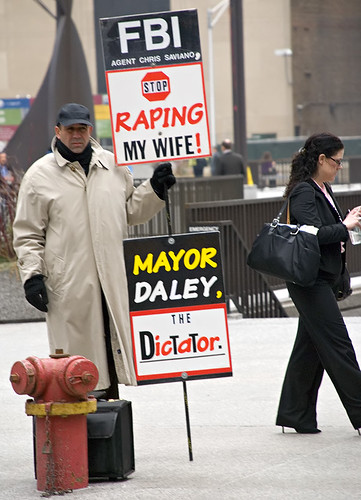
We've been discussing so-called superdelegates for a couple weeks now (some blog entries may not have been posted yet, but trust me, there are several), so Ari Berman's brief history lesson is interestingly appropriate.
Rewind to the 1968 Democratic National Convention, which showcased the undue influence of the party's old guard. Big-city bosses like Chicago Mayor Richard Daley handed the nomination to Hubert Humphrey, despite Humphrey's support for a deeply unpopular war and the fact that he hadn't won a single primary. As Rick Perlstein recounts in his forthcoming book, Nixonland, Eugene McCarthy won 79 percent of the vote in the Pennsylvania primary but got less than 20 percent of the state's delegates at the convention. The rest were picked by the party machine. The will of the voters was ignored at the convention, and protesters on the streets outside it were met with clubs and tear gas.
Despite the backroom double-dealing, supporters of McCarthy and Robert Kennedy were able to pass a rule at the convention mandating a study of how the party picked its nominee. This rather innocuous effort, initially led by Iowa Governor Harold Hughes, a popular liberal reformer, led to the McGovern Commission, whose 1970 report, Mandate for Reform, led to a sweeping revision of party politics, which greatly expanded the number of primaries and ensured that convention delegates were roughly proportional to primary vote results; drastically reduced the power of party officials to serve as delegates and dictate the choice of nominee; and mandated a greater role for rising forces within the party--young people, women, minorities. The new rules helped catapult two dark horses to the nomination, McGovern himself in 1972 and Jimmy Carter in 1976.
By 1980 the party establishment had seen enough. It struck back with a commission of its own, led by North Carolina Governor James Hunt. It returned power to elected officials and party regulars--the superdelegates, who will make up about 20 percent of the 4,049 delegates at the Democratic convention. They include all Democratic members of Congress and every governor, but roughly half of them are Democratic National Committee officials elected by state parties, who range from top party operatives to local city council members. Key interests in the party, like labor groups, can also name superdelegates. According to political scientist Rhodes Cook, superdelegates were created as a "firewall to blunt any party outsider that built up a head of steam in the primaries."
That's what happened in 1984, when Senator Gary Hart launched an insurgent challenge to front-runner Walter Mondale. Hart won sixteen state primaries and caucuses to Mondale's ten, and barely lost the popular vote. Yet Mondale locked up virtually all the party's 700 or so superdelegates even before the primary began. Hart likely would have lost anyway, but the superdelegates sealed his defeat. "I got almost none of them, because [Mondale] was considered inevitable," Hart told me.
[Click to read more of Not So Superdelegates]
Bottom line, if there are riots on the streets of Denver this summer, we'll know why: Bill Clinton's DLC party buddies fixed the election in Ms. Clinton's favor.
The obvious beneficiary of the superdelegates this time around is another establishment favorite, Hillary Clinton. Before Super Tuesday, Obama had sixty-three pledged delegates, compared with Clinton's forty-eight. But as we went to press Clinton had a huge advantage in superdelegates, 184 to ninety-five, according to CNN. "Many of the superdelegates were in and out of the Clinton White House, invited to dinners, have received contributions from Clinton allies," says Hart, who has endorsed Obama. "There will be pressure brought to bear to cash in those chips."
Clinton has a wealth of contacts to tap, in the party and in her campaign. There's the former President himself, of course, and Clinton's campaign chair, Terry McAuliffe, who ran the DNC from 2001 to 2005, and a top Clinton surrogate, Harold Ickes, who serves on the DNC's influential rules committee. The Clintons are working hard to bring the large bloc of uncommitted superdelegates into the senator's camp. "I know Hillary is calling superdelegates regularly, which is a smart play," says Art Torres, California Democratic Party chair. Interviews with superdelegates in Alabama, California, Colorado and Massachusetts--a random sample of February 5 states--illustrate this close attention. After Ramona Martinez, a Denver city councilwoman, switched her support from Bill Richardson to Clinton, she received immediate thank-you calls from McAuliffe and Clinton adviser Ann Lewis. In Alabama "Hillary would get the majority of the superdelegates," predicts state party chair Joe Turnham. "A lot of it is longstanding relationships. People go back to the 1980s with Bill Clinton, when he first came to Alabama."
Bonus footage: Mr. Berman explains in YouTube form
